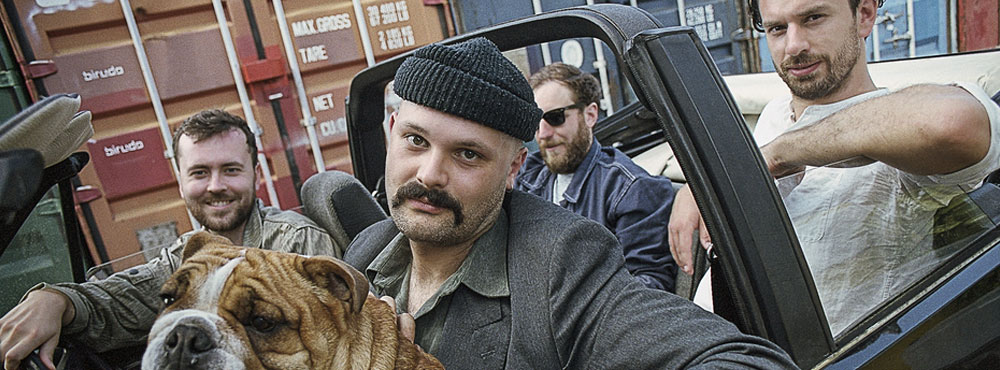
By Anna Spyropoulos
The blueprint for releasing an album in the midst of a global pandemic is unsurprisingly nowhere to be found, and though low on the list of global priorities, it is a tricky one to navigate for emerging bands. Not that TV Priest is such a band. Though the group managed to slide in but a single gig to promote their latest album (in an industrial freezer no less) before Covid froze the world in time, their history is a long one.
Childhood friends, the quartet formed in 2010 as a then quintet, Torches. Torches were closer to the glam-goth than the muted-malcontent end of the post-punk scale. They had moderate success before the group disbanded to pursue ‘real lives ’ and ‘real jobs’, as said in an interview with Julia Mason. The band regrouped in 2019 from a ‘need to create together’ once again and now comprises frontman Charlie Drinkwater, drummer Ed Kellan, Keyboardist Nic Bueth, and guitarist Alex Sprogis. Their comeback is characterised by the added gravitas of experience, and perhaps with the self-awareness that their music will not change the system, all the while preserving the hopeful anarchistic fervour that maybe it just might.
The prefix of ‘post’ in post-punk is suggestive of a time been and gone, but that is simply not the case. The success of ‘Ultra Mono’ by the IDLES, debuting at No.1 in Sept 2021 has cemented the genre’s consistent popularity and harked to not a revival, but an evergreen seat at the table of rock. In terms of the post-punk cornerstones, TV Priest’s debut album at first glance hits the mark; with a discordant, cacophonous musical assault that oscillates between motorik 4/4 beats, industrial thrums, synth riffs, and the occasional refractory period of calm before the storm rages on. Yes, they’re easily identifiable as post-punk in more than name. Drinkwater as frontman brings more of a dad-rock aesthetic, walrus moustache in tow, from which he spits his biting critiques of contemporary culture (including but not limited to avocado toast or Corden’s carpool karaoke). This seems fitting given that the origins of the band’s name stem from large-scale televised evangelical sermons in America, and the consumerist approach to spirituality in mass media. The lyrics are delivered in the lurching talk-song much like Mark E. White from The Fall – or think Leonard Cohen if he were fighting with Susanne. And, well, like the genre dictates, their music rattles the listener from within.
The structure and narrative within the songs and the lyrics, in general, are hard to pin down Delivered exclusively in non-sequiturs, the quasi-philosophical stutterings focus on the mundane. Delivered exclusively in non-sequiturs, the pseudo-philosophical stutterings about the mundane are often disconnected to the point of unintelligibility and are perhaps let down by their smart-assed self-awareness. They do, ultimately, unite like a jigsaw puzzle where the pieces don’t quite fit, but you still get a sense of the bigger picture And, after all, post-punk is more rooted in sentiment than form.
In a similar vein to The Fall, Protomartyr and Fontaines D.C. (clear influences on the band), TV Priest and their latest album Uppers enter the eye of the resurgence of a grubby, gritty and very British style of post-punk. The current landscape of political, cultural, and personal uncertainty has primed the listener for something chaotic and outraged to help hurl us through to the next day. But TV Priest do bring more than the general rant’n’roll of the moment. The band’s history as friends, and their coming back together carries with it a time-tempered ambition of what can be changed, and an added dry cynicism towards the system. Their experience allows them to discuss topics that one does not see their younger genre compatriots broach. For example, on the 7-minute closing anthem, ‘Saintless’, dedicated to Drinkwater’s wife and son, he punctuates the synth to preach a sermon of his own;
“This world is dark, with saintless few/So guard your love, but give it too’’.
Tender musings on fatherhood and interpersonal relations are not typically found in the chronicles of post-punk lyricism, yet within the context of TV Priest, the world right now, and Uppers, it works. TV Priest feels akin to an adult fighting with their father in a coherent and assured way, rather than the assuredly angry but incoherent adolescent of two decades previously. TV Priest sees rage, optimism, and a good dose of lived experience deliver a genre-pushing statement album with Uppers. TV Priest, the dad-rockers redefining post-punk in a post-pandemic age.